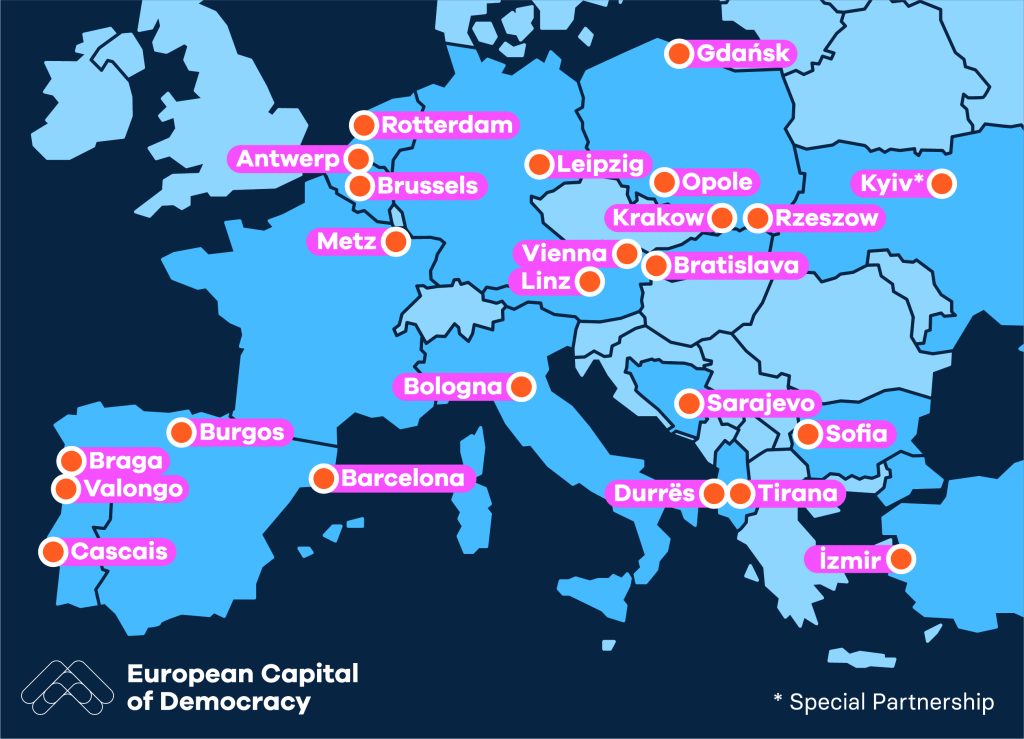Following a successful first Programme Year in Barcelona, which welcomed over 20,000 participants, hosted 100 events, and facilitated two participatory processes, five cities across Europe will be competing for the prestigious title of European Capital of Democracy 2026. This competition not only highlights their commitment to democratic innovation but also underscores the initiative’s growing impact and longevity, as the European City Network grows to 24 member cities from 15 countries.
The cities competing for the title of European Capital of Democracy 2025/26 are Cascais (Portugal), İzmir (Turkey), Krakow (Poland), Rotterdam (Netherlands), and Sofia (Bulgaria). The new applications expand the geographic and cultural diversity of ECoD member cities, growing the network to 24 cities in 15 countries. This development underscores Europe’s unwavering commitment to democratic principles. Moreover, numerous cities have already expressed their interest in competing for the ECoD 2027 title, underscoring the lasting impact and widespread appeal of this initiative.
By competing for the title, the cities demonstrate their dedication to democratic innovation and citizen engagement. The European City Network provides a platform for collaboration and the exchange of best practices, empowering cities to lead in safeguarding democratic values even during challenging times.
Helfried Carl, Founder of ECoD, underlined the critical role cities play in strengthening democracy, stating: “Cities are uniquely positioned to safeguard and advance democracy and human rights as they are closest to the needs of their citizens. This impressive and motivated third group of contenders expands the ECoD City Network, while the interest shown by many cities for 2027 reaffirms the initiative’s longevity. In these times of crises, cities have proven to be bullwarks of democracy against an authoritarian wave. Their exchanges on democratic innovations can help rejuvenate our political systems.”
Selection process
European Capitals of Democracy are chosen through a two-stage process. First, an Experts’ Jury, comprising five distinguished professionals in democracy, urban planning, and development, rigorously evaluates each application based on clear, transparent criteria outlined in the annual Call for Submissions. Following these steps, the final decision rests with a Citizens’ Jury composed of over 4,500 engaged individuals from all Council of Europe member states and Kosovo. In the first selection round, Barcelona was chosen as the inaugural Capital of Democracy 2023/24. Vienna, the second titleholder, just started its Democracy Year on 19 November, offering a dynamic programme of democratic initiatives for the term 2024/25. The European Capital of Democracy 2026 will be selected and announced by mid-March 2025.
Impact of the initiative
The title-holding city works closely with civil society and its citizens to organise a range of engaging activities and events, attracting visitors from across Europe, and fostering collaboration to advance democracy, education, and innovation. The title also bolsters the city’s international reputation as a hub for democratic excellence, promoting civic pride and enhancing its status as a leader in progress. Additionally, the city takes on a leading role in the European City Network and hosts meetings, where representatives from member cities convene to exchange knowledge and best practices in municipal democracy promotion
